Related Research Articles
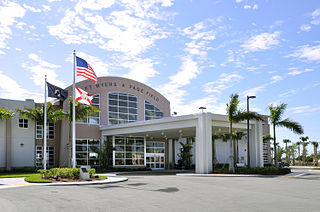
Lee County is located in southwestern Florida, United States, on the Gulf Coast. As of the 2020 census, its population was 760,822. In 2022, the population was 822,453, making it the eighth-most populous county in the state. The county seat is Fort Myers, with a population of 86,395 as of the 2020 census, and the largest city is Cape Coral, with an estimated 2020 population of 194,016.
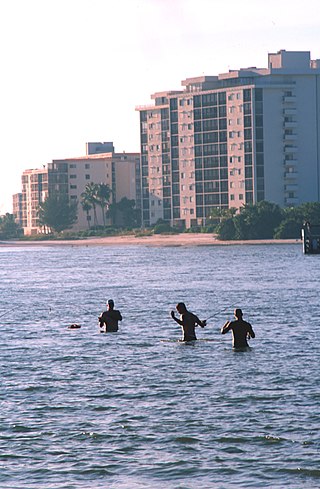
Fort Myers Beach is a town located on the North end of Estero Island in Lee County, Florida, United States. The town is on the Gulf of Mexico and is accessed from the mainland by a bridge over Estero Bay. It is part of the Cape Coral-Fort Myers, Florida Metropolitan Statistical Area. It was officially incorporated on December 31, 1995. The population was 5,582 at the 2020 census, down from 6,277 at the 2010 census.

Sanibel is an island and city in Lee County, Florida, United States. The population was 6,382 at the 2020 census, down from 6,469 at the 2010 census. It is part of the Cape Coral-Fort Myers, Florida Metropolitan Statistical Area. The island, also known as Sanibel Island, constitutes the entire city. It is a barrier island—a collection of sand on the leeward side of the more solid coral-rock of Pine Island.

The Sanibel Causeway is a causeway in Southwest Florida that spans San Carlos Bay, connecting Sanibel Island with the Florida mainland in Punta Rassa. The causeway consists of three separate two-lane bridge spans, and two-man-made causeway islands between them. The entire causeway facility is owned by Lee County and operated by the Lee County Department of Transportation (DOT). The causeway is 3 miles (5 km) long with a $6 toll for island-bound vehicles only.
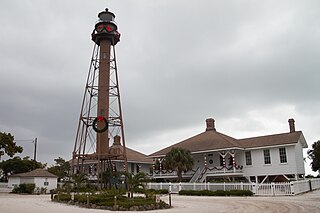
The Sanibel Island Light or Point Ybel Light was one of the first lighthouses on Florida's Gulf coast north of Key West and the Dry Tortugas. The light, 98-foot above sea level, on an iron skeleton tower was first lit on August 20, 1884 and has a central spiral staircase beginning about 10 feet above the ground. It is located on the eastern tip of Sanibel Island, and was built to mark the entrance to San Carlos Bay for ships calling at the port of Punta Rassa, across San Carlos Bay from Sanibel Island. The grounds are open to the public, but the lighthouse itself is not.
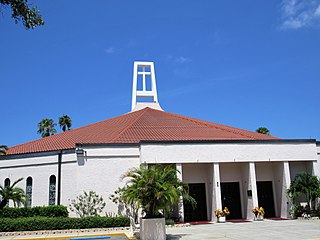
The Diocese of Venice in Florida is a Latin Church ecclesiastical territory–or diocese, of the Catholic Church in southwest Florida in the United States. It was founded on June 16, 1984. Frank Dewane has been bishop since 2007. The Diocese of Venice in Florida is a suffragan diocese of the metropolitan Archdiocese of Miami.
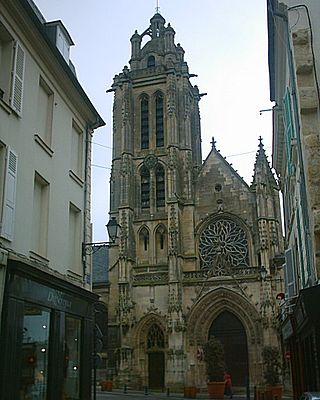
Pontoise Cathedral is a Roman Catholic church located in the town of Pontoise, on the outskirts of Val d'Oise in Paris, France. The cathedral, dedicated to Saint Malo, has been the episcopal seat of the Diocese of Pontoise since its creation in 1966. It was formerly a parish church.

St. Michael's Church is a historic Episcopal church at 225 West 99th Street and Amsterdam Avenue on Manhattan's Upper West Side in New York City. The parish was founded on the present site in January 1807, at that time in the rural Bloomingdale District. The present limestone Romanesque building, the third on the site, was built in 1890–91 to designs by Robert W. Gibson and added to the National Register of Historic Places in 1996.

St. Mark's Episcopal Church is a parish of the Episcopal Church in Palatka, Florida in the United States, in the Episcopal Diocese of Florida. The current rector is The Rev. Jon Davis, PhD.
Holy Apostles Episcopal Church, is an historic Carpenter Gothic church building now located at 505 Grant Avenue in Satellite Beach, Florida in the United States. It was built in 1902 some 100 kilometers to the south in Fort Pierce to serve St. Andrew's Episcopal Church, which it did until March 25, 1959, when St. Andrew's moved into a much larger structure and gave its old building, less its organ and stained glass windows, to the old Episcopal Diocese of South Florida to be used as a mission church. The diocese gave it to Holy Apostles, which had been formed in 1957 and had been holding services in a synagogue, and it was barged up the Indian River on July 14, 1959 to Satellite Beach, where it became the first church building in that two-year-old city just south of Patrick Space Force Base.

The Episcopal Diocese of Southwest Florida is a diocese of the Episcopal Church in the United States of America (ECUSA) in Florida which extends from Marco Island on the south, to Brooksville on the north, and inland to Plant City, Arcadia and LaBelle on the east. As part of the ECUSA, the diocese is a constituent member of the worldwide Anglican Communion.

St. Michael's AnglicanChurch is a historic church and the oldest surviving religious structure in Charleston, South Carolina. It is located at Broad and Meeting streets on one of the Four Corners of Law, and represents ecclesiastical law. It was built in the 1750s by order of the South Carolina Assembly. It is listed on the National Register of Historic Places and is a National Historic Landmark.
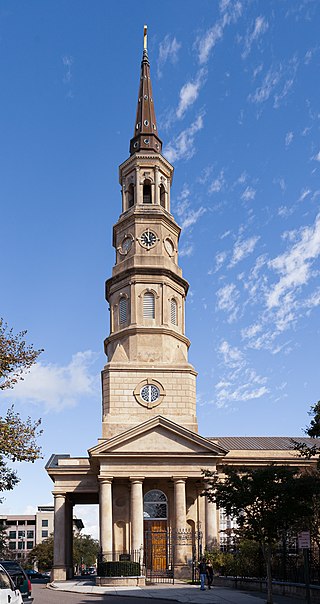
St. Philip's Church is an historic church at 142 Church Street in Charleston, South Carolina. Its National Historic Landmark description states: "Built in 1836, this stuccoed brick church features an imposing tower designed in the Wren-Gibbs tradition. Three Tuscan pedimented porticoes contribute to this design to make a building of the highest quality and sophistication." On November 7, 1973, it was added to the National Register of Historic Places and designated a National Historic Landmark.

St. Anne's Episcopal Church is a historic Episcopal church located in Church Circle, Annapolis. The first church in Annapolis, it was founded in 1692 to serve as the parish church for the newly created Middle Neck Parish, one of the original 30 Anglican parishes in the Province of Maryland. It remains in use by the Parish of St. Anne, part of the Episcopal Diocese of Maryland.

St. Andrew's Episcopal Church is an active Episcopal parish and historic church building in Tampa, Florida, United States. The structure is located downtown at 505 North Marion Street, however, the parish offices are located at 509 East Twiggs Street. On April 15, 2009, the church building was added to the U.S. National Register of Historic Places (NRHP). Francis J. Kennard and Michael J. Miller are credited as the building's architects.
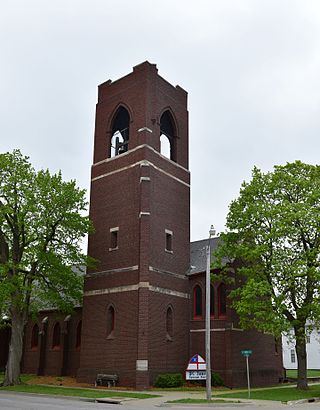
St. James Episcopal Church is a parish of the Diocese of Iowa located in Oskaloosa, Iowa, United States. It was listed on the National Register of Historic Places in 1991.

All Saints' Episcopal Church is an Episcopal Church in Lakeland, Florida, United States. It is in the Diocese of Central Florida.

St. John's Episcopal Church, historically known as St. John's Anglican Church, is a church in Christiansted, Virgin Islands. Although most of the current building dates to 1868, a church has been located on the site since the 18th century. It and its adjacent graveyard were listed on the National Register of Historic Places in 2016. It is located within the Christiansted Historic District, to which it is also a contributing property.

St. Luke's Episcopal Church is an Episcopal church in Atlanta, Georgia. The parish was founded in 1864, with the current building on Peachtree Street constructed in 1906.
References
- ↑ "Our History". www.saintmichaels-sanibel.org.
- ↑ "Noah's Ark Thrift Shop to Reopen". 17 January 2024.
- ↑ "St. Michael's church returns to Sanibel 10 months after Ian". FOX 4 News Fort Myers WFTX. July 22, 2023.
- ↑ "St. Michael's Church - Sanibel Restoration". www.saintmichaels-sanibel.org.
- ↑ Cole, Joshua (August 28, 2024). "Sanibel's St. Michael's Church bell tower rings once again, signaling resilience after Hurricane Ian". WBBH.